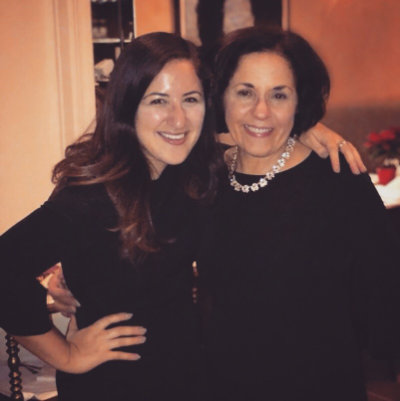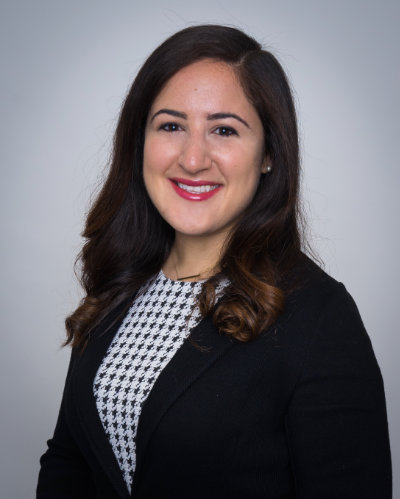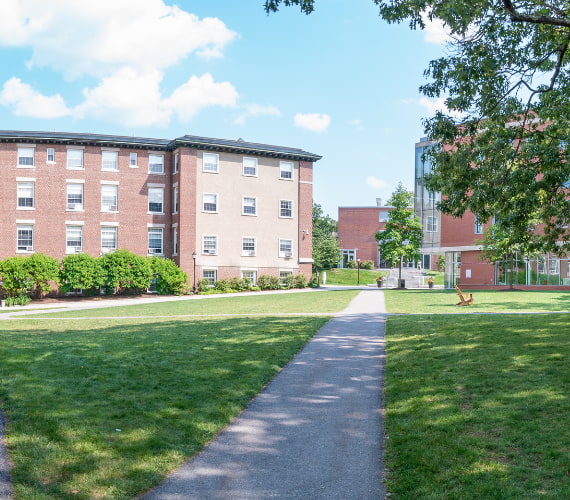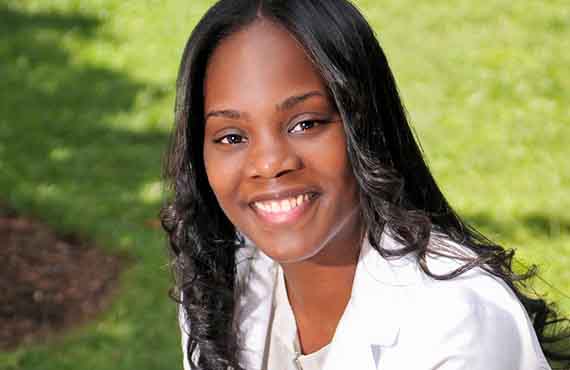After she graduated from the Nurse Practitioner program at Regis College, Lauren Ghazal BSN ’15, MSN ’16 moved to New York to work as a family NP and pursue her PhD from New York University (NYU), when she began feeling tired and losing weight. “I attributed it to a normal adjustment to the hustle of New York City life,” she recalls. But when Ghazal identified a non-tender lymph node on herself, she went to her primary care physician and a series of specialists before receiving a diagnosis of Hodgkin Lymphoma. Ghazal’s personal experience profoundly influenced her career path, one which began with a seemingly sharp turn from economics, which she majored in at Boston College, to nursing at Regis.
 “I didn’t initially think I would go into nursing, hence the economics background,” Ghazal confesses. “But the more I spoke to my mom about what I wanted to do, the more it made it made sense to enter this field and use my unique training in economics to improve healthcare delivery. What’s special about nursing is that you can find an area within the field that fits you.”
“I didn’t initially think I would go into nursing, hence the economics background,” Ghazal confesses. “But the more I spoke to my mom about what I wanted to do, the more it made it made sense to enter this field and use my unique training in economics to improve healthcare delivery. What’s special about nursing is that you can find an area within the field that fits you.”
While Ghazal’s undergraduate major led her mother to assume that Lauren would pursue economics, Marie Ghazal was happily surprised that her daughter chose nursing. As both a nurse and the CEO of the Rhode Island Free Clinic, Marie knew that “Having a background in economics and nursing is perfect. Lauren understands finances, business and the administrative side of health care, and as a nurse practitioner, is in the forefront of our healthcare delivery system.”
Professor Susan Sawyer teaches Advanced Nursing Research, a class that Ghazal considered one of the most influential in her education. “I have not had a student combine the principles of economics and nursing research into a scientific nursing research question before,” Sawyer wrote. “She particularly emphasized cost effective health care and how nursing interventions can promote cost effectiveness in health care. She pointed out that nurses involved in clinical practice and research can use principles of economics to provide nursing care that is less costly but equally effective. Needless to say I was impressed with her understanding and awareness of the issues.”
 Ghazal found plenty of overlap between the two disciplines. “It’s actually incredible how much of my economics background I have brought to my clinical, research and personal healthcare experiences,” she writes. “During my time at Regis, I had all of these serendipitous opportunities that steered me to pursue a research career in nursing,” among them a graduate assistant position with the Haiti and International Nurse Faculty partnerships, “incredible experience in clinical research” as a nurse at Beth Israel Deaconess Medical Center, and influential academics including Professor Sawyer’s course and a Community Health class with Dr. Lisa Fardy. “All of these contributed to my decision to apply to a PhD program focused broadly on health services research.”
Ghazal found plenty of overlap between the two disciplines. “It’s actually incredible how much of my economics background I have brought to my clinical, research and personal healthcare experiences,” she writes. “During my time at Regis, I had all of these serendipitous opportunities that steered me to pursue a research career in nursing,” among them a graduate assistant position with the Haiti and International Nurse Faculty partnerships, “incredible experience in clinical research” as a nurse at Beth Israel Deaconess Medical Center, and influential academics including Professor Sawyer’s course and a Community Health class with Dr. Lisa Fardy. “All of these contributed to my decision to apply to a PhD program focused broadly on health services research.”
In a letter of recommendation for PhD programs, Fardy praised Ghazal’s “innate charisma that enables her seemingly effortless interactions with patients, providers, and professors.”
Ghazal was in the first semester of her program at NYU when a student who had been shadowing her for the day asked about the lymphatic system. Ghazal had the student do a practice exam on her and the student felt a node. An exam by her primary care physician a few weeks later led to an ultrasound, a biopsy, some initially inconclusive results, and ultimately, a visit to an oncologist who made the Hodgkin Lymphoma diagnosis.
“I had just moved to New York four months before my diagnosis,” she recalled in a conversation with Dr. Eleonora Teplinsky, an oncologist and host of a podcast called Interlude. “I was still trying to establish my community in a new place, so even friends I had just met [I had] to say ‘Hey, actually this place told me I should bring somebody with me to this appointment. You want to come?”
The way Ghazal arrived at the diagnosis and events unfolded gave her a surprising perspective. “I think I’ve given myself the opportunity to laugh at this story now,” she reflects. “I think I’m okay with finding it kind of ironically funny.”
Now three years in remission and a fellow at University of Michigan in cancer care delivery research, Ghazal is the first nurse ever awarded the T32 postdoctoral training funded by the National Cancer Institute. “My hope is (borrowing this from Vice President Harris) that while I may be the first nurse, I will not be the last,”) she quips.
But her own diagnosis profoundly impacted the direction of her research and her career.
“The experience of undergoing grueling treatment alongside a demanding PhD program forced me to shift my research to adolescent and young adult (AYA) survivorship and has informed my entire program of research,” she wrote.
Ghazal talked with nurses throughout her treatment and interviewed young cancer survivors who were diagnosed with lymphoma or leukemia.
“I came out of active treatment asking so many questions about…what happens now and how do we best support young adults after they’re diagnosed with cancer throughout their entire survivorship. I looked at the current literature and I saw there were many gaps in the area.”
Ghazal points out that while more young adults are being diagnosed with cancer, more are surviving longer than ever before. “I was really interested in looking at this relationship between one’s work-related goals—how cancer impacted their future career—and then how that ultimately impacted their quality of life,” she told Dr. Teplinsky.
“I experienced first-hand the disparities that AYA cancer survivors face,” she writes, “and am excited for the contributions I will make to this field as a patient, clinician and researcher.”


